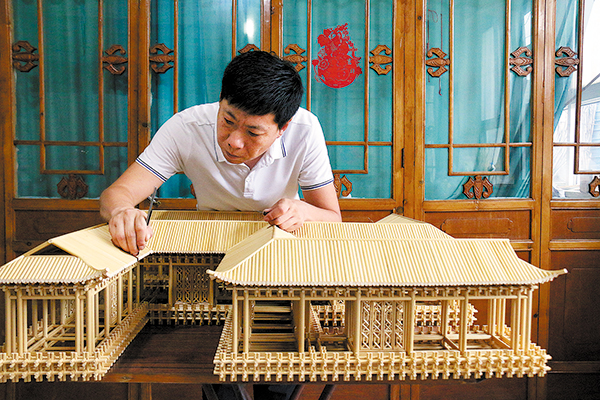Foundations of creativity on straw
Sorghum craftsman turns grain stalks into stunning works of art, Yang Feiyue reports.
By Yang Feiyue | China Daily | Updated: 2023-12-16 12:06

Cultivation of interest
Under the influence of his father Xu Yanfeng, who was named a national inheritor of the art in 2009, Xu Jian got his hands on sorghum straws in childhood.
He still vividly remembers how his father would follow a film featuring scenes of Tian'anmen Square when it was circulated among neighboring villages and then note down all the details before creating a delicate miniature of it for over three years.
"The city wall, city tower, auxiliary building, Jinshui Bridge and ornamental columns were all complete, and every door and window could open and close freely," he recalls.
The work was then sent to Japan for exhibition and collected by a local museum. Ever since, many of his father's works made their way to exhibitions at home and abroad.
In order to render sorghum stalks sturdier and a more uniform color, Xu Yanfeng independently came up with a hybrid that is more robust and flexible than the garden-variety species after two years of experimentation.
Under his father's instructions, Xu Jian managed to pull off small trinkets, such as cricket cages and distinctive Chinese knots in childhood.
He became committed to the art after he reached 19, getting into the depth of the related techniques.
"My father urged me to keep in mind traditional Chinese architectural skills and the history of traditional building protections, and to apply them to my own sorghum straw artworks," he says.
Through hands-on guidance from his father, Xu Jian's skills became increasingly proficient. He mastered the whole process, from sorghum seed cultivation, harvesting, sorting and measuring to designing, drawing, grooving, fitting and assembling the main structure.
"Sorghum straw carving and tying are unique skills with which you can construct a three-dimensional structure based on a photography of a building," Xu Jian says.
This is also the most challenging aspect of the art, he says, adding that one needs to meticulously plan each section of a sorghum straw work in the mind, then translate it into drawings before finally constructing it.
"The creative process is often mentally taxing. When I have a clear idea, I have to execute it in one go; otherwise, I'll need to rethink, which ends up taking more time," Xu Jian says.
Over the years, many have approached Xu Jian's family to learn the art, but only a few stay the course, due to the time-consuming nature of the art and labor intensity.
"For instance, the details are the key, and you need to use a caliper to measure each sorghum stalk to ensure they meet the standard, while controlling force in the production process, so every cut is just right, not too shallow nor too deep," he says.
"One also must endure loneliness during the practice."
























